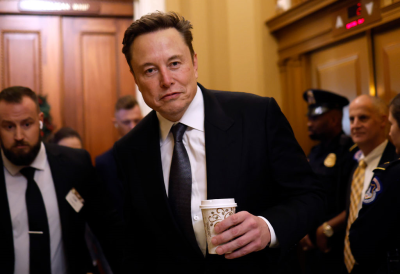Para leer en español, vea esta traducción de El Tiempo Latino.
Elon Musk, who has been tapped by President-elect Donald Trump to lead a committee to ferret out government waste, wrongly posted to X that members of Congress are trying to vote themselves a 40% raise.
A continuing resolution put forward by Republicans leading the House Appropriations Committee does attempt to allow an automatic congressional pay increase — which has drawn blowback from some members of Congress — but the maximum possible raise in 2025 would be 3.8%, not 40%.
The continuing resolution, a stopgap measure to keep the government funded for three months, needs to be enacted before midnight on Dec. 20 to avoid a government shutdown.
“How can this be called a ‘continuing resolution’ if it includes a 40% pay increase for Congress?” Musk wrote on X on Dec. 18.

Musk, the Space X and Tesla CEO who along with Vivek Ramaswamy was tapped by Trump to lead the new Department of Government Efficiency, linked to a post from “Wall Street Mav” that says Congress was trying to “slip by” a “pay increase for members of Congress from $174,000 to $243,000 per year.”
That’s not accurate.
The bill seeks to allow an automatic cost-of-living increase for congressional pay — which Congress has opted out of since 2009. But the Congressional Research Service said the raise would amount to 3.8% in 2025, not 40%.
It does require some legislative sleuthing to uncover that Congress has proposed a pay increase. (Bloomberg Government first reported it.) Page 15 of the proposed continuing resolution includes a sentence to strike language from a previous appropriations act that had blocked an automatic pay increase from taking effect.
Although the Constitution prescribes that members of Congress set their own compensation rate through legislation, it’s often politically unpopular for members to vote in favor of giving themselves a raise. A law passed in 1989 sought to make it easier, politically, by including an automatic annual cost-of-living pay raise tied to the Employment Cost Index (and limited by the percentage base pay increase for white-collar federal employees).

But as the Congressional Research Service explains, Congress for years has blocked those automatic pay increases from taking effect. Indeed, the pay for rank-and-file members of Congress has been frozen at $174,000 a year since 2009. (Those in leadership positions earn more.)
“If Members of Congress had received every adjustment prescribed by the ECI formula since 1992, and the statutory limitation … regarding the percentage base pay increase for [General Schedule federal] employees remained unchanged, the 2024 salary would be $243,300,” the CRS report said. (Had the automatic cost-of-living adjustments taken effect just since 2009, pay would now be $217,900, the report states.)
That is presumably where the $243,000 figure cited in the X post comes from.
But that’s not how much the continuing resolution would raise congressional pay.
As the CRS report notes, “The maximum potential January 2025 adjustment is 3.8%, which would result in a salary of $180,600, an increase of $6,600.”
Again, some legislators don’t think they should get any raise.
Rep. Jared Golden, a Democrat from Maine, vowed to oppose the continuing resolution if it included a raise for members of Congress.
“Congress should be working to raise Americans’ wages and lower their health care costs, not sneaking new member perks into must-pass legislation behind closed doors,” Golden said in Dec. 18 press release. “If members can’t get by on our already generous salaries and benefits, they should find another line of work.”
But unlike Musk, Golden got the size of potential raise correct.
“Members of Congress currently earn $174,000 annually — more than 90 percent of Americans,” Golden stated. “If enacted, this CR would allow for a 2025 adjustment of 3.8 percent, which would result in a Member salary increase of $6,600.”
Update, Dec. 21: The pay raise was stripped from the continuing resolution, which passed Congress in the early hours of Dec. 21.
Editor’s note: FactCheck.org does not accept advertising. We rely on grants and individual donations from people like you. Please consider a donation. Credit card donations may be made through our “Donate” page. If you prefer to give by check, send to: FactCheck.org, Annenberg Public Policy Center, 202 S. 36th St., Philadelphia, PA 19104.